So, I’m breaking my rule here just a bit. My goal for this year was to write about those thing I love more than the things I dislike. But today is Halloween, and this one in particular has been weighing on my mind of late. I’m going to talk about a sci-fi/fantasy trope that I would REALLY like to see go away: incompetent antagonists.
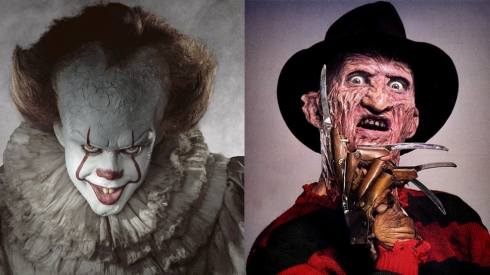
Trick! This post has nothing to do with either of them! Both of them are pretty cool as is.
See if this sounds familiar…a plucky band of heroes is just so darn good. And clever! The bad guys, by contrast, might have cool tech and uniforms, but they are largely idiots, or exceedingly arrogant (or both). Because the heroes have the ‘heart’ of 100 Rocky Balboas, they are able to snatch victory out of the lazy, slackened jaws of defeat. Hooray! Everyone goes home.
Based on this, I’m proud to introduce Carson’s First Law of Villainy: The level of satisfaction the audience experiences from the heroes’ victory is directly proportional to the competence of their opposition.
Or, in other words, the greater the threat, the greater the payoff. If it seems nigh-impossible for the heroes to succeed, the more of a “YAAAS” moment you get when the they finally — somehow — pull it off. Villains are key to this. You can have a weak villain and still have a fun, engaging story (Marvel Cinematic Universe, I’m looking at you in most cases), but the writer does his heroes a disservice if the opposition they face is weak or ineffectual.
Let’s look at some examples. Think of a bad guy or set of bad guys. This can be from books, movies, comic books, really anywhere. Why were they memorable? Why were they a threat to the protagonist, and what lengths did the hero or heroes have to go to defeat them? For me, one figure immediately springs to mind.
This guy.
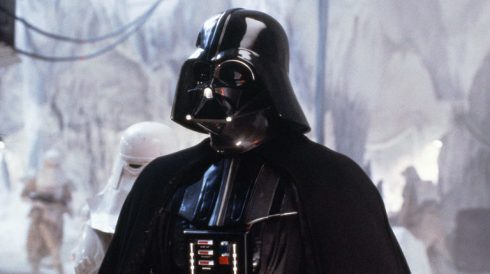
Come to the Dark Side…we have cookies!
Darth Vader.
Not, Anakin Skywalker. No, the Dark Lord of the Sith as he was portrayed in Episodes 4, 5, and 6. He’s powerful, in control, and a dire threat to anyone who gets in his way. Every time the heroes cross paths with him, they pay for it. Obi-Wan goes down, he cuts off Luke’s Hand, and Han gets encased in carbonite.
He’s always one step ahead, and going up against him directly seems like a suicide mission. So, when Luke does finally defeat him, it shows how far the character has come. The Luke who whined about going into Tosche Station to pick up power converters couldn’t have faced Vader and lived. It had to be the Luke who wore all black, who single-handedly stormed Jabba’s barge like a boss to do that. In essence, Luke had to grow into Vader’s looming threat. As I’ve said before, it’s the presence of the wolf, not its absence, that makes the deer fast.
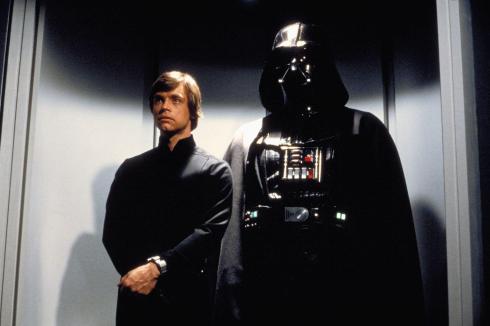
And the winner for Most Improved goes to…
Of course, Grand Moff Tarkin does refuse to evacuate the station out of sheer arrogance, but that’s the difference between the two characters. Tarkin was certainly competent in other ways, but ultimately fell prey to this classic movie trope: His belief in his own superiority sews the seeds of his downfall. In the end, however, I think the original Star Wars trilogy does a good job of establishing the Empire as a legitimate danger to make its defeat feel like an accomplishment. (Stormtroopers who can’t hit the broad side of a barn, notwithstanding.)
Let’s look at a really bad example. I must preface this by saying that I’m big fan of this author’s work, and have been so for 20 years or more. But lately, the bad guys are bad at what they do. Really bad. Let’s talk about Shadow of Freedom, by David Webber, a novel in one of the spin-offs of his Honor Harrington universe.

Despite being front and center on the cover, Honor Harrington never appears directly.
I posted my review on Goodreads, but here’s the part that pertains to this topic. The bad guys are some of the worst I’ve ever read. There are multiple sets of them, and they are all idiotic, arrogant, AND their tech is way inferior to the good guys. In short, they are cockroaches being run over by a semi. They can’t even really fight back. They either flee or they die, without presenting even the slightest bit of threat or challenge.
If it only happened once in the book, that would be one thing, but it happens over and over again. And this isn’t the only Honor Harrington book where this is the case, I’m sorry to say. I want to see the protagonists struggle to achieve their goal, to really fight for it, sacrifice for it. There’s none of that here, because the bad guys are disposable, stupid, and pose no real danger.
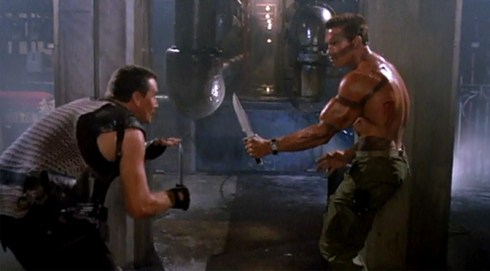
Yeah, pretty much like that.
That brings me to Carson’s Second Law of Villainy: The audience should, in some way, empathize with the antagonist enough to — almost — wish them to succeed in place of the protagonist.
This is stepping outside the speculative realms, but think about Hans Gruber from the original Die Hard movie, played by the incomparable Alan Rickman. He is a cold-blooded killer, a terrorist, and a worthy adversary of Bruce Willis’ John McClane. Even though we hope McClane is able to triumph over Gruber, the moment that Gruber’s team opens the vault is genuinely exciting. For an instant, you almost feel elated that they have accomplished their goal, even though they’ve done some horrible things to get there. You temporarily suspend your wish for McClane’s victory in favor of Gruber. It’s only for a moment, but it’s there.

The man himself.
Even this can be traced to Gruber’s innate competence. He knows what he’s doing. He has it together. He has a thought-out master plan and the will and resolve to see it through. That he is very good at what he does contributes to the menace he represents to McClane. If Gruber and company were a bunch of bumbling idiots, McClane’s triumph wouldn’t have been nearly so resounding.
Another example of this is Gus Fring from Breaking Bad, in my opinion one of the greatest TV villains of all time, and Giancarlo Esposito’s masterwork. (Spoiler Alert) Even though Gus represents deadly peril to our protagonists, Walter and Jesse, it’s pretty satisfying to see him take down the Juarez Cartel. Again, we’ve seen this guy literally slit a guy’s throat in cold blood just to make a point, but in this moment we are glad that Gus has won the day. And he did this through superior planning, a deep knowledge of his targets and their foibles, and a driving determination to avenge his dead friend, Max. Again, competence.

Is today the day, Hector?
It’s these instances of success where we can’t help but cheer, even though we know we shouldn’t. And it’s these moments that lead me to Carson’s Third Law of Villainy: Antagonists should believe and behave as though they are the protagonists in their own story.
Perhaps the most chilling thing about some of the worst people who have ever lived in real life is that they thought they were the good guys. They all thought they were the hero in their own story. A well-rounded antagonist should likewise believe this. They aren’t just there to be a convenient obstacle, to wait around to be defeated or killed, they have goals and dreams like anyone, albeit twisted by our standards. In their view, the hero is the actual villain of the piece.
One of the most unsettling examples of this is the movie Falling Down. I’ve heard it said that you can tell the protagonist of a story by looking for the one in the most pain. Not so with this movie. Even though the story revolves around William Foster (Michael Douglas), he is really the antagonist. We see that he’s in pain, and that he’s fed up with the world, but when Robert Duvall’s Sgt. Prendergast confronts him at the end of the movie, Foster says “I’m the bad guy? How’d that happen?”

His glasses aren’t the only thing that’s cracked.
And, just to throw a curve ball into the mix, let’s talk about the Operative (Chiwetal Ejiofor) in Serenity. He certainly passes the competency test. He’s articulate and extremely dangerous, and also strangely empathetic towards his victims.
He passes the first two laws of villainy with flying colors, but not the third. That is perhaps the only failing in an otherwise command appearance. The Operative knows that he’s a monster, that what he’s doing is wrong, and yet he does it anyway. That’s the only part of this character that doesn’t ring true to me, especially when Shepherd Book says that men like the Operative ‘believe hard’ and ‘never ask why.’ The Operative knows he’s a villain, which in my estimation, makes him less of one.
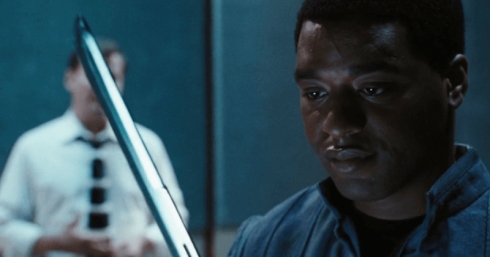
Perhaps there is nothing left to see.
Well, there you have it, Carson’s Three Laws of Villainy, and how the use of them can prevent a milquetoast antagonist. Villains fuel the story’s conflict, and what is a good story without conflict?
So, if you’re writer of any sort of fiction, do us a favor and make your villain as compelling as your hero. Make your protagonist rise to the challenge. And if you can, have your villain go out with a bit of style or panache. (That’s more of a personal request, however.)
Truth is, we all deserve better bad guys in our stories. Villains aren’t good, but by the horned helmet of Loki, they should at least be good at it!

Burdened with glorious purpose, indeed.
May 20th, 2018 at 10:07 pm
[…] him. In many ways, Infinity War is his story. He acts and behaves accordingly, he passes all of my rules of villainy, and walks perhaps a darker version of Campbell’s hero’s journey. Even the credits say […]
May 21st, 2022 at 1:08 am
[…] you’ve read this blog for any length of time, you know that I really love literary villains. In one of my posts, I talk about how villains should always behave as though they are the central hero of their own […]